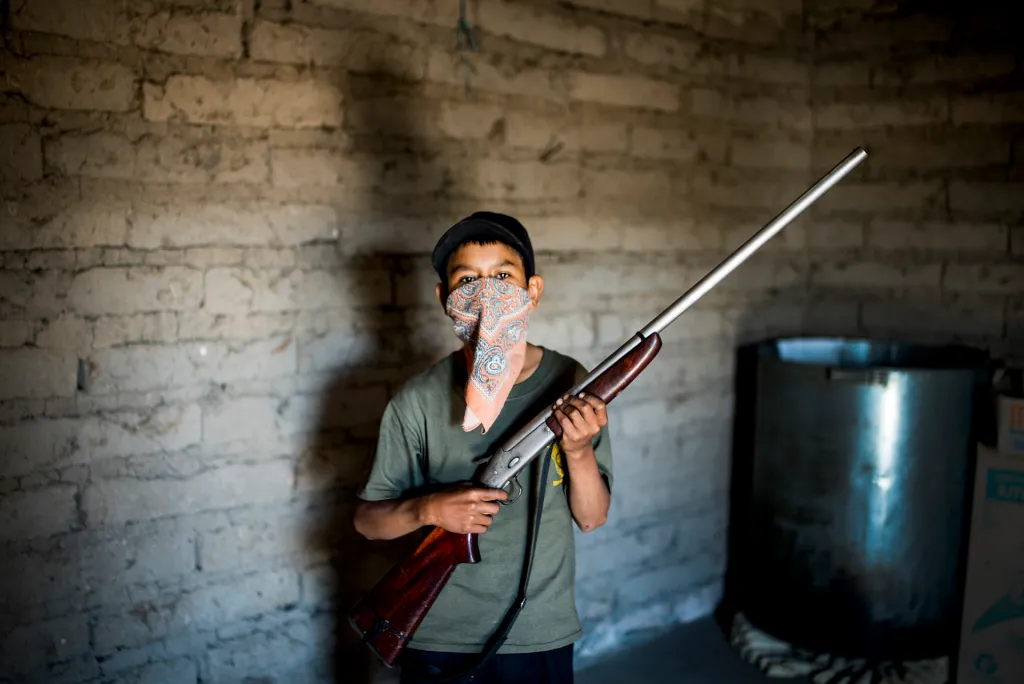Sol remembers her first kill for a Mexican cartel: a kidnapping she committed with a handful of other young recruits that twisted into torture and bled into murder. She was 12 years old.
Sol had joined the drug cartel a few months earlier, recruited by someone she knew as she sold roses on the sidewalk outside a local bar. She started as a lookout, but rose fast.
The cartel liked her childish enthusiasm for learning new skills, her unquestioning loyalty, and perhaps most importantly, her status as a minor protected her from severe punishment if the cops ever caught her.
“I obeyed the boss blindly,” Sol, now 20 years old, told Reuters, speaking from the rehabilitation center in central Mexico where she is trying to patch her life back together. “I thought they loved me.”
Sol declined to say how many people she killed during her time in the cartel. She said she’d been addicted to methamphetamine from the age of nine. When she was 16 she was arrested for kidnapping – her only criminal conviction – and spent three years in juvenile detention, according to her lawyer.
Reuters is withholding Sol’s full name, and the names of the city where she worked and the cartel she joined, to protect her. The news agency was unable to independently verify the details of Sol’s account, although psychologists at the center and her lawyer said they believed it was accurate.
Security experts say children like Sol are a casualty of a deliberate strategy by Mexican organized crime groups to recruit minors into their ranks by preying on their hunger for status and camaraderie.
In cartel slang they are known as ‘pollitos de colores’ or ‘colorful chicks,’ after the fluffy baby chicks sprayed with lurid toxic colors and sold at Mexican fairgrounds. They’re cheap, burn bright, and don’t live long.
Reuters spoke to 10 current and six former child assassins, as well as four senior cartel operatives, who said cartels are increasingly recruiting and grooming young killers.
Their experiences reveal the growing brutalization of Mexican society and the failure of President Claudia Sheinbaum and past governments to address not only the expanding territorial influence of the cartels but their extensive cultural hold too.
Mexico’s presidency and interior ministry did not reply to requests for comment.
The news agency contacted active cartel members through Facebook and TikTok. Many shared pictures of themselves holding rifles, one had a cap emblazoned with a cartoon chicken firing off automatic rounds – a reference to the ‘colorful chicks.’ They were aged between 14 and 17.
Most said they had been recruited by relatives or friends, joining principally out of a desire to belong to something. They usually came from homes wrecked by violence and drugs. Many were already battling addictions of their own to drugs like cocaine or methamphetamine.
“You join with your death sentence already signed,” said one 14-year-old child killer who has worked for a cartel for eight months, requesting anonymity to protect themselves. “But it’s worth it,” they said. Now they’re no longer hungry and have a sense of family.
FAILED POLICIES
Although 15 security experts and those within the cartels say child recruitment is becoming more common, a lack of hard data makes the issue difficult to track.
The U.S. government’s Bureau of International Labor Affairs estimates that some 30,000 children have joined criminal groups in Mexico. Advocacy groups say the number of vulnerable children prone to being recruited is as high as 200,000. It is not clear how these numbers have changed over time, though experts say child recruits are getting younger.
A Mexican government report into the cartel recruitment of children published last year found minors as young as six have joined organized crime and also highlighted the growing use of technology, like video games and social media, to draw in young recruits.
The report said 70% of adolescents pulled into the cartels grew up surrounded by high levels of extreme violence.
In 2021, Mexican authorities intercepted three boys between the ages of 11 and 14 in the state of Oaxaca who they said were about to join a cartel after being recruited through the violent multiplayer game “Free Fire.”
Mexico’s National Guard has since issued guidelines on the safe use of video games, while a legislative proposal is currently before the Lower House seeking to criminalize the cultural glorification of crime in music, TV, and video games.
“We see more and more criminal groups co-opting ever younger children,” said Dulce Leal, a director at Reinserta, an advocacy group focused on children who have been victims of organized crime. She said this trend has grown alongside the use of new technologies like video games with integrated chat messaging systems.
At the rehabilitation center in central Mexico, another former child killer, Isabel, 19, who is being treated for extreme trauma and depression said her uncle recruited her when she was 14. The uncle helped her murder a former teacher who had raped her, she said, and they then became a couple despite him being 20 years her senior.
He got her pregnant but she miscarried, she thinks because of her heavy drug use.
Reuters was unable to corroborate all of Isabel’s account, but her arrest as an unnamed child cartel member was published in news reports at the time.
Isabel had tattoos with her uncle’s name removed, but still bears a stencil of his faceless silhouette.













